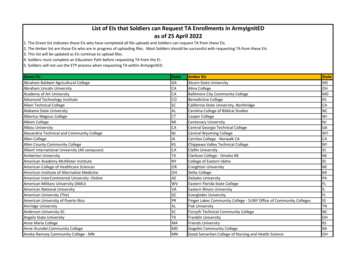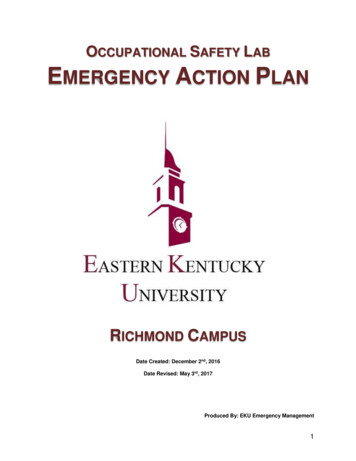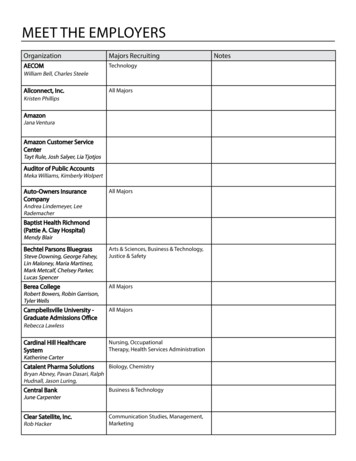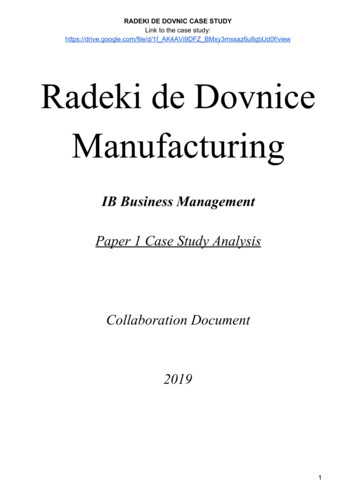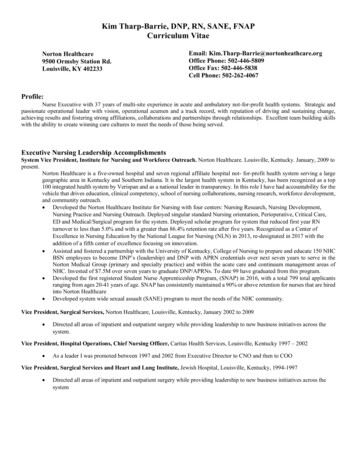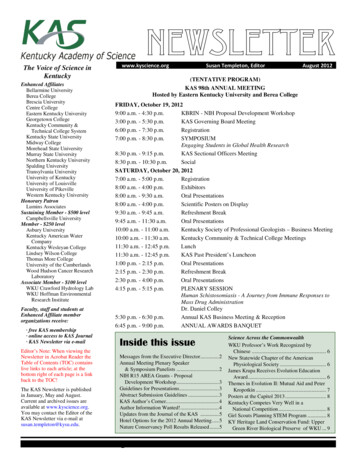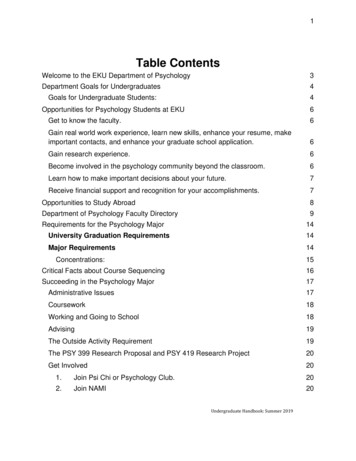
Transcription
1Table ContentsWelcome to the EKU Department of Psychology3Department Goals for Undergraduates4Goals for Undergraduate Students:4Opportunities for Psychology Students at EKU6Get to know the faculty.6Gain real world work experience, learn new skills, enhance your resume, makeimportant contacts, and enhance your graduate school application.6Gain research experience.6Become involved in the psychology community beyond the classroom.6Learn how to make important decisions about your future.7Receive financial support and recognition for your accomplishments.7Opportunities to Study Abroad8Department of Psychology Faculty Directory9Requirements for the Psychology Major14University Graduation Requirements14Major Requirements14Concentrations:15Critical Facts about Course Sequencing16Succeeding in the Psychology Major17Administrative Issues17Coursework18Working and Going to School18Advising19The Outside Activity Requirement19The PSY 399 Research Proposal and PSY 419 Research Project20Get Involved201.Join Psi Chi or Psychology Club.202.Join NAMI20Undergraduate Handbook: Summer 2019
23. Other ways to get involved.21How to Study21Tutoring- PASS Program24Why Should I Learn a Second Language?25Preparing For The Future27DEGREES IN PSYCHOLOGY27CAREER POSSIBILITIES27EXPLORING CAREER DIRECTIONS37GRADUATE SCHOOL39EKU Psychology Graduate Programs43Reasons to Major in Psychology47Undergraduate Psychology Course Descriptions (PSY)49Frequently Asked Questions56Sample Curriculum Guide For B.S. Degree In Psychology60Psychology and the Criminal Mind61Psychology and the Skills Employers Want63Jobs for Psychology Majors65Cover art by Steve Falkenberg, Professor EmeritusUndergraduate Handbook: Summer 2019
3Welcome to the EKU Department of PsychologyOn behalf of our faculty and staff, welcome to the Department of Psychology at Eastern KentuckyUniversity. Congratulations on your decision to join a caring community of faculty and students who sharea sense of excitement about the science and practice of psychology. Your courses covering core andspecialized topics will expose you to a stimulating range of questions and ideas about human behavior. Adegree in psychology will prepare you for a wide range of career options and offers a solid foundation forfurther graduate level study. You will find our faculty to be exceptional teachers, mentors, and advisorswho are excited about their work and strongly committed to student success. You will also find themeasily accessible and eager to get to know you. Our department is nationally recognized for promotingstudent and faculty collaboration on research projects. Each year a number of our undergraduates are coauthors of papers published and presented at professional meetings.We pride ourselves on our relaxed and student-friendly environment. The Cammack Building, home tothe Psychology Department, features student lounge/study areas as well as state of the art equipment inour classrooms and computer lab. We have active student organizations: Psi Chi (the national psychologyhonor society) and the Psychology Club (open to all students interested in psychology). We encourageyou to participate in these unique opportunities for social and academic engagement.This Undergraduate Student Handbook is designed to familiarize you with our departmental policies andprocedures and to provide information that will make your life here easier. I encourage you to read it,keep it handy, and refer to it often. I also encourage you to discuss any questions you have with youradvisor.Again, welcome. Please feel free to drop by my office if you have any concerns, or if you just want to sayhello.Dr. Robert BrubakerFoundation Professor and ChairDepartment of PsychologyCammack 127859-622-1105robert.brubaker@eku.eduP.S. Be sure to visit the Psychology Department website, www.psychology.eku.edu, and follow us onyour favorite social media!@EKUPsychologyekupsychology.tumblr.comEKU Psychology DepartmentEKU Psychology Dept.EKU Psychology OfficeUndergraduate Handbook: Summer 2019
4Department Goals for UndergraduatesThe mission of the Department of Psychology at Eastern Kentucky University is toempower students, through the study of psychology, to lead more satisfying personal,professional, and intellectual lives.The department faculty has adopted the following student learning outcomes forpsychology majors. We are committed to helping students achieve these objectives bythe time they graduate with a degree in psychology from EKU.Goals for Undergraduate Students:Goal #1: Psychological Theory and Content Students will understand major concepts, theoretical perspectives, empiricalfindings, and historical trends in psychology.Goal #2: Research Methods and Information Literacy Students will demonstrate information competency and the ability to usetechnology for diverse purposes.Students will appreciate the importance of using scientific inquiry rather than onlypersonal experience and history.Goal #3: Critical and Creative Thinking Students will use critical and creative thinking, skeptical inquiry, and, whenappropriate, the scientific method when solving problems related to behavior andmental processes.Goal #4: Application of Psychology Students will understand and apply psychological principles in many areas of life.Students will develop insight into the mental processes and behaviors of self andothers, as well as those of social groups and institutions.Students will apply informed and effective strategies to promote adaptiveoutcomes for self and others, in personal, social, and organizational interactions.Goal #5: Ethical and Social Responsibility Students will apply ethical standards in the evaluation and engagement inpsychological science and practice.Undergraduate Handbook: Summer 2019
5 Students will demonstrate a recognition and understanding for the complexity ofdiverse human gender, culture, ethnicity, life choices, behaviors, and abilities.Goal #6: Communication & Collaboration Students will demonstrate competence in written, oral, and interpersonalcommunication skills.Students will be able to collaborate effectively in diverse interactions.Goal #7: Maximize Student Success Students will pursue realistic ideas about how to implement their psychologicalknowledge, skills, and values in occupational pursuits in a variety of settings thatmeet personal goals and societal needs.Undergraduate Handbook: Summer 2019
6Opportunities for Psychology Students at EKUGet to know the faculty.1. Come to our “Lunch for Majors!” Look for announcements around the CammackBuilding for free lunch with other students and faculty. Everyone is welcome!The event is generally hosted once each semester.2. Work with faculty mentors to pursue specialized topics in Psychology. Enroll inPSY 497 (Topics in Psychology), PSY 402 (Independent Work in Psychology),PSY 403 (Practicum in Psychology), and/or PSY 399 and PSY 419 (ResearchDevelopment Skills).3. Faculty have an open-door policy and welcome the opportunity to talk withstudents. Feel free to discuss issues with any member of the faculty.4. Develop a good working relationship with your advisor, who can help you chooseclasses and make important career decisions.Gain real world work experience, learn new skills, enhance your resume, makeimportant contacts, and enhance your graduate school application.1. Enroll in PSY 349 (Co-op). See Dr. Theresa Botts.Gain research experience.1. Collaborate with faculty on research projects (informally or by registering for PSY399, 419, and/or 402).2. Present your work at professional conferences.3. Co-author publications with faculty.Become involved in the psychology community beyond the classroom.1. Join the Psychology Club (see Dr. Theresa Botts).2. Join Psi Chi, the national psychology honor society (see Dr. Theresa Botts).Undergraduate Handbook: Summer 2019
73. Attend lectures. Look for announcements around the Cammack Building.4. Participate in professional development activities. The Psychology Departmentfinancially assists students who travel to professional conferences.5. Attend our Professional Workshops. For more information about these contactDr. Yoshie Nakai (yoshie.nakai@eku.edu).Learn how to make important decisions about your future.1. Enroll in PSY 2582. Discuss your future with your advisor and other faculty members. Takeadvantage of your advisor’s expertise and experience.3. Explore different career directions by enrolling in co-op (PSY 349). Takeadvantage of opportunities afforded by a flexible curriculum to pursue a secondmajor or minor.Receive financial support and recognition for your accomplishments.1. Apply for the Knapp Scholarship, Hindman Scholarship, and the Kennamer Scholarship(see Dr. Theresa Botts for details).2. Apply for student research support moneyUndergraduate Handbook: Summer 2019
8Opportunities to Study AbroadEKU students can participate in diverse study abroad opportunities, immersing themselves inforeign cultures and climes for course credit and personal growth. Programs last from two tofive weeks to an entire semester in dozens of countries around the world including China,France, Italy, Japan, Ecuador, Spain, Turkey, Australia, Brazil, and England. Coursescovering a wide variety of topics, including psychology, are available during the fall, spring, andsummer sessions, and during the winter and spring breaks. The Psychology Departmentstrongly encourages students to study abroad and, dependent on student interest, offerscourses in Observation of Animal and Human Behavior, Human Ethology and NonverbalBehavior, Psychology of Art, Psychology of Religion, and Psychological Disorders ofChildren. Though we urge students to learn new languages, study abroad classes are taught inEnglish and students are not required to speak a foreign language to participate (except insome advanced foreign language courses). A limited number of scholarships are available toqualified students.Eastern is a member of the Kentucky Institute for Study Abroad and the Cooperative Center forStudy Abroad. You can visit their websites for more information (http://www.kiis.org andhttp://www.ccsa.cc/). In addition, the Psychology Department periodically offers its own studyabroad programs in Ecuador and Spain.If you would like to learn more about these exciting opportunities, contact Dr. Steffen Wilson(steffen.wilson@eku.edu) or Dr. Robert Brubaker (robert.brubaker@eku.edu) in the PsychologyDepartment or Jennifer White, the Director of Study Abroad for the university(Jennifer.white@eku.edu), 859-622-1705, Keith Building Room 129).For information on scholarships for study abroad programs contact Jennifer White.Undergraduate Handbook: Summer 2019
9Department of Psychology Faculty DirectoryTheresa Botts, Ph.D. (Assistant Professor, Psi Chi Advisor)Office Number: Cammack 233Office Phone: 622-2318Email Address: theresa.botts@eku.eduPh.D. University of Kentucky, 2001Professional Interests: cognitive behavior therapy, feminist perspective, trauma workand gender issuesRobert G. Brubaker, Ph.D. (Foundation Professor and Chair; Director, Psychology Clinic)Office Number: Cammack 127Office Phone: 622-1105Email Address: robert.brubaker@eku.eduPh.D. University of South Florida, 1984Professional Interests: clinical psychology, psychology and artMyra Beth Bundy, Ph.D. (Professor)Office Number: Cammack 110Office Phone: 622-1003Email Address: myrabeth.bundy@eku.eduPh.D. University of South Carolina, 1996Professional Interests: clinical psychology, mental retardation, autism,neuropsychological assessment, children and families, developmental psychopathologyMichael Chen, Ph.D. (Assistant Professor)Office Number: Cammack 106Office Phone: 622-1105Email Address: hung-tao.chen@eku.eduPh.D: University of KentuckyProfessional Interests: experimental psychology, text-to-speech, student successUndergraduate Handbook: Summer 2019
10Dan Florell, Ph.D. (Associate Professor)Office Number: Cammack 202Office Phone: 622-1291Email Address: dan.florell@eku.eduPh.D. Illinois State University, 2000Professional Interests: school psychology, cyberbullyingJon Gore, Ph.D. (Associate Professor, EKU Coordinator of Undergraduate Research)Office Number: Cammack 116Office Phone: 622-1115Email Address: jon.gore@eku.eduPh.D. Iowa State UniversityProfessional Interests: social psychology, close relationships, relational goalsJaime Henning, Ph.D. (Associate Professor, Coordinator of I-O Graduate Program)Office Number: Cammack 217Office Phone: 622-8178Email Address: jaime.henning@eku.eduPh.D. Texas A&M UniversityProfessional Interests: I-O psychology, volunteerism, citizenship behaviorSara Incera, Ph.D. (Assistant Professor)Office Number: Cammack 104Office Phone: 622-8623Email Address: sara.incera@eku.eduPh.D. Cleveland State UniversityProfessional Interests: cognitive psychology, bilingualism, languageAdam Lawson, Ph.D. (Professor)Office Number: Cammack 112Office Phone: 622-1564Email Address: adam.lawson@eku.eduPh.D.: Oklahoma State University, 2001Professional Interests: cognitive neuroscience, psychophysiology, memory and agingUndergraduate Handbook: Summer 2019
11Radhika Makecha, Ph.D. (Assistant Professor)Office Number: Cammack 223Office Phone: 622-1105Email Address: radhika.makecha@eku.eduPh.D. University of Southern MississippiProfessional Interests: animal studies, comparative psychology, animal behavior andcognition, animal welfare and conservationRobert Mitchell, Ph.D. (Foundation Professor, Coordinator of General Psychology M.S.)Office Number: Cammack 114Office Phone: 622-3122Email Address: robert.mitchell@eku.eduPh.D. Clark University, 1987Professional Interests: Understanding of mirrors and self-recognition in primates,deception in humans and animals, talk to dogs during play, interpretations ofanimal psychology, psychological interpretations of music, children’sunderstandings of pretense and false beliefs, interpretations of gays and lesbians,origins of sexual desiresMelinda Moore, Ph.D. (Assistant Professor)Office Number: Cammack 223Office Phone: 622-3067Email Address: melinda.moore@eku.eduPh.D. The Catholic University of America, 2012Professional Interests: clinical psychology, suicide/suicide prevention, bereavement,substance abuseYoshie Nakai, Ph.D. (Associate Professor)Office Number: Cammack 108Office Phone: 622-1110Email Address: yoshie.nakai@eku.eduPh.D. University of Akron, 2011Professional Interests: industrial/organizational psychology, aging workforce, job searchbehavior, cross-cultural issues at workUndergraduate Handbook: Summer 2019
12Teri Nowak, Ph.D. (Associate Professor)Office Number: Cammack 203Office Phone: 622-1106Email Address: teri.nowak@eku.eduPh.D. University of KentuckyProfessional Interests: school psychology, early childhood, persons with special needsRichard Osbaldiston, Ph.D. (Associate Professor)Office Number: Cammack 102Office Phone: 622-3055Email Address: richard.osbaldiston@eku.eduPh.D.: University of Missouri, 2004Professional Interests: social and personality psychology, quantitative methods,internalization, environmental psychologyJerry K. Palmer, Ph.D. (Associate Professor)Office Number: Cammack 232Office Phone: 622-2531Email Address: jerry.palmer@eku.eduPh.D. Georgia Institute of Technology, 1999Professional Interests: industrial /organizational psychology, perceptual judgment contrasteffect, citizenship behavior, credit history, The Big Five Personality Theory, performanceappraisalAndrea Strait, Ph.D. (Associate Professor, Coordinator of School Psychology Program)Office Number: Cammack 112Office Phone: 622-1109Email address: andrea.strait@eku.eduPh.D.: University of Tennessee, 2005Professional Interests: school psychology, curriculum-based measurement, academicinterventionAlex Varakin, Ph.D. (Associate Professor)Office Number: Cammack 222Office Phone: 622-2511Email Address: donald.varakin@eku.eduPh.D.: Vanderbilt University, 2006Professional Interests: visual perception, cognitive psychology, attentionUndergraduate Handbook: Summer 2019
13Steffen Pope Wilson, Ph.D. (Professor)Office Number: Cammack 201Office Phone: 622-8677Email Address: steffen.wilson@eku.eduPh.D. University of Georgia, 1997Professional Interests: development of cognitive inhibition, memory developmentMatthew P. Winslow, Ph.D. (Professor)Office Number: Cammack 217Office Phone: 622-6171Email Address: matthew.winslow@eku.eduPh.D. University of Minnesota, 1998Professional Interests: social psychology, prejudice, stereotypesDustin Wygant, Ph.D. (Professor, Director of Clinical Training)Office Number: Cammack 218Office Phone: 622-6796Email address: dustin.wygant@eku.eduPh.D.: Kent State University, 2007Professional Interests: forensic psychology, assessment, MMPIUndergraduate Handbook: Summer 2019
14Requirements for the Psychology Major(Fall 2014 Catalog or later).University Graduation Requirements General Education . 39 hoursFoundations for Learning (GSD 101; waived for transfers with 30 hours) . 3 hoursWriting Intensive Course (Hrs. incorporated into Major/Supporting/Gen Ed/Free Electivescategory)Upper division courses (42 hrs. distributed throughout Major/Supporting/Gen Ed/Free Electivescategories)ACCT (Credit hours may be incorporated into Major or Supporting requirements)Psychology majors will select one of the following: PSY 400, or 401, or 579Total Hours University Graduation Requirements . . .42 hoursMajor RequirementsA minimum grade of “C” is required in all courses counted toward the major.Core Courses . 34 hoursPSY 200, 250, 258, 309W(4), 310, 499 (0), and at least 3 hours from each of the following areas: Biological Bases of Behavior: PSY 311, 315, 315L (students in the Substance Abuse orBrain and Cognitive Science Concentrations must select 311 for this group) Cognition/Learning: PSY 317, 322, 333 Developmental: PSY 312, 314, 316 (students in the Child and Family Psychology must select312; students in the Psychology of the Workplace Concentration must select either 314 or 316;students in the Art Therapy Concentration must select 312) Social/Personality: PSY 300, 305, 308 (students in the Substance Abuse, Autism Spectrum,Forensic, or Workplace and Art Therapy Concentrations must select 308) Skills: PSY 318, 319, 399, 405, 406, 490, 590 (Students in the Substance AbuseConcentration must select 490; students in the Child and Family Concentration must select 406;students in the Workplace or Art Therapy Concentration must select 405) Capstone: 349 (3 hours), 400, 401, 419 or 579Undergraduate Handbook: Summer 2019
15Concentrations:Psychology (General) .9 hours9 hours of psychology electives. At least 3 hours must be numbered 400 or above. (PSY 280,402 and 403 may not be used as a psychology elective.)Art Therapy .12 hoursPSY 305, 412, 314 or 316, and one of the following: 406, 408, 476 or 477Substance Abuse . .12 hoursPSY 305, 405, 406, 429Developmental Disabilities/Autism Spectrum Disorders . .12 hoursPSY 312, 406, 408; PSY 477 or 577Forensic Psychology .12 hoursPSY 300, 305, 314, 466Child and Family Psychology .12 hoursPSY 314, 405, 408 and one of the following: 318, 321, or 377Psychology of the Workplace .12 hoursPSY 300, 305, 319, 590Brain and Cognitive Sciences . 15 hoursPSY 315, 317, 413; one of the following: PSY 322, 333 or approved 497/597; one of thefollowing: BIO 307, CSC 160, MAT 234(4), PHI 352Psychiatric Rehabilitation .15 hoursPSY 337, 349 or 403; 405, 429, 437Free Electives.28-35 hoursTOTAL HOURS TO COMPLETE DEGREE.120 hoursStudents pursuing any of the Concentrations are strongly encouraged but not required tocomplete PSY 349 Co-operative Study in the Concentration area.Art Therapists are required to earn a Master’s degree in Art Therapy. Admission to Art TherapyMaster’s programs requires 18 hours of studio art classes in addition to the psychology classesthat make up the concentration. Students pursuing the Art Therapy Concentration most alsocomplete an 18hr Art Minor.Undergraduate Handbook: Summer 2019
16Important Note for Transfer Students and Students who have changed their major:You should allow at least three to four semesters to complete the required psychologycourses. We strongly recommend that you take PSY 258 during your FIRST semester.Critical Facts about Course SequencingThere is a particular order in which some psychology and supporting courses must betaken. PSY 200 is a pre-requisite for all other psychology courses. PSY 250 and MAT 105(or higher) or STA 215 are prerequisites for PSY 309W, and PSY 309W is a prerequisitefor some other PSY courses. Suggested timing for these courses is:Freshmen (0-30 hours)PSY 200 and PSY 250MAT 105, or better yet, MAT 107 or higher (105 is a prerequisite for PSY 309W) or STA215PHI 100 (Practical Reasoning) is strongly recommended.Sophomore (30-60 hours)PSY 309W (first semester; PSY 309W is a pre-requisite for PSY 310 and several otherpsychology courses).PSY 310 (second semester; PSY 310 is a prerequisite for PSY 399, 419, and 400)Additional Prerequisites:Be sure to check the course descriptions for special prerequisites for 400 levelpsychology courses, and note that completion of three of the five psychology arearequirements is a prerequisite for PSY 400. Also, students must have 15 hours ofpsychology before enrolling in cooperative study (Co-op) in psychology (PSY 349)Transfer students and students changing their major:The psychology major typically requires a minimum of three to four semesters tocomplete.Undergraduate Handbook: Summer 2019
17Succeeding in the Psychology MajorAdministrative Issues1. Know your undergraduate catalog. The catalog describes University policies,explains your General Education requirements, provides information about studentservices and financial aid, lists the requirements for the major, and includes all coursedescriptions. The catalog is available on the EKU website (www.undergraduatestudies.eku.edu/catalog). Note that General Education requirements are described inUndergraduate Catalog.2. Check out the EKU Colonel’s Compass for important dates/deadlines atwww.eku.edu/students.3. Deadlines to watch for:a. Application for Graduation: December graduates - apply before the end of thepreceding April. May and August graduates: apply by the end of the precedingOctober. If you have any questions about graduation, you may direct those toMegan Estes in the College of Arts & Sciences (megan.estes@eku.edu).c. Registration: Check on the on-line schedule book for dates when you can registereach semester.3. Make sure the university has your correct address (email and regular mail)Your EKU email address is the official email address for EKUstudents. The university and the faculty will send importantinformation to your official student account. Be sure to checkit often.Undergraduate Handbook: Summer 2019
18Coursework1. Study Time: The university policy is that you should allow a minimum of 2 to 3 hoursoutside of class for homework/study purposes for each hour spent in class. Thus, for a 3-unitclass, you need to allow for 6 to 9 hours outside class per week for studying. This means youwill need to appropriately balance course load and outside responsibilities so that you havesufficient time for your classes. The purpose of the study time is for you to learn coursematerial and to develop general thinking skills, and skills specific to your discipline.2. Be an active student: Use active study practices, e.g., reading with a question inmind, self-testing, and talking with classmates about course material. Also, ask questionsin class and in your professor’s office about course material and assignments. Satisfyyour curiosity and clarify your confusions by talking with your professor.3. Authorship: Your exams, papers and all other assignments must reflect your ownwork, unless you are explicitly directed otherwise by your instructor.Working and Going to SchoolMany students find it necessary to work and attend school. This is less than an ideal situationin terms of schoolwork, but it is a reality. Often students entering the university for the first time,either from high school or community college, underestimate the amount of time required to dowell in their classes. As one progresses in the major, the workload per unit, the difficulty of thecourse material, and the number and complexity of assignments usually increase. It will thenbe necessary to reduce either work hours or course load. When work hours and course loadsare too high, grades will suffer and stress will be excessive. Often these problems maybecome apparent when it is too late to drop a class. This means you should consider the workschool balance when registering for classes. You may have to make sacrifices either in termsof fewer units per semester or reducing your income. However, the benefits of doing so aresubstantial. If you allow sufficient time to study, use the library, and meet with faculty, you willget much more out of your courses and maximize the chances that your grades will reflect yourtrue potential. You will also have more time to get involved in department and universityactivities. The Psychology Department and EKU have a lot to offer; don’t miss theseopportunities because you are overloaded.Undergraduate Handbook: Summer 2019
19AdvisingYou must see your advisor each semester before you can register. It is important to reviewyour Degree Works report with your advisor, and to discuss with your advisor your long-termgoals, progress in your courses and any problems you are having with your experience atEKU. Your advisor will give you your RAC number, which you need in order to register.1. The calendar Colonel’s Compass (www.eku.edu/students) gives the dates when theofficial Advising Periods begin and end (typically around the end of October andMarch). During the Advising Period, professors will have sign-up sheets postedoutside their office for you to schedule appointments. You may not register withouthaving seen your advisor.2. Get the most out of your advising appointments. Before meeting with your advisor:a. Examine your Degree Works report, Schedule of Classes, and Course Descriptionsin the Undergraduate Catalog.b. Make a list of questions you have about scheduling classesc. Make a list of questions you have about long term goals and other matters3. As questions and problems arise during the semester, see your advisor for help.Can’t decide which Psychology classes to take? Check out the Department’s YouTubechannel s4H ssQ). You’ll find briefinterviews with professors about some of the classes they offer!The Outside Activity RequirementAll students in PSY 200, 250, 309W and 310 are required to earn 6 hours of outside activitycredits. These can be earned in various ways such as serving as a participant in research orattending department colloquia. The purpose of this requirement is to expose you topsychology in action. By participating in research and listening to speakers about research andpractice, you get first-hand exposure to the science and practice of psychology. Finally,completing outside activity requirements is a great way to get ideas for your own researchproposal that you may write in PSY 399 and carry out in 419.Undergraduate Handbook: Summer 2019
20The PSY 399 Research Proposal and PSY 419 Research ProjectPsychology majors may elect to pursue an independent research project by taking PSY 399and 419. In 319 you will develop and write a formal research proposal and then, in PSY 419,carry out and write up the results. As you take classes in psychology it is important to keepthis project in mind. Keep a list of topics that interest you and questions you might investigatethat can form the basis of your proposal. Also, a good way to create a pool of ideas for yourproposal is to keep records of all your Outside Activity units. You may want to propose a studysimilar to one you participated in or read about when fulfilling your outside activity credits.Finally, use psychology faculty (in addition to your course instructor) as resources for thisproject. Your project can be connected to faculty research, or you can seek the advice ofprofessors who have expertise in areas related to your proposal. IF YOU THINK YOU MIGHTBE INTERESTED IN THESE CLASSES, TALK TO YOUR ADVISOR NOW, even if you’re juststarting out in the major.Get Involved1. Join Psi Chi or Psychology Club.Psi Chi and Psychology Club are student organizations that provide a way to get to knowfellow psychology majors and to participate in a variety of psychology-related activities. Forexample, Psi Chi and Psychology Club members participate in field trips to enhance theirunderstanding of the psychology profession. They attend conferences such as theSoutheastern Psychological Association. The members of the two clubs also work together tocoordinate community service activities within the local community.Psychology Club is open to anyone; you do not have to major or minor in psychology to join,and there is no minimum GPA requirement. Membership in Psi Chi is only open to psychologymajors. Psi Chi at Eastern Kentucky University is a chapter of the National Honor Society inPsychology, which is located around the nation at more than 1,000 colleges and universities.Becoming a member of Psi Chi gives you an opportunity to attend local, regional and nationalforums for obtaining information and developi
Email Address: dan.florell@eku.edu Ph.D. Illinois State University, 2000 Professional Interests: school psychology, cyberbullying Jon Gore, Ph.D. (Associate Professor, EKU Coordinator of Undergraduate Research) Office Number: Cammack 116 Office Phone: 622-1115 Email Address: jon.gore@eku.edu Ph.D. Iowa State University

